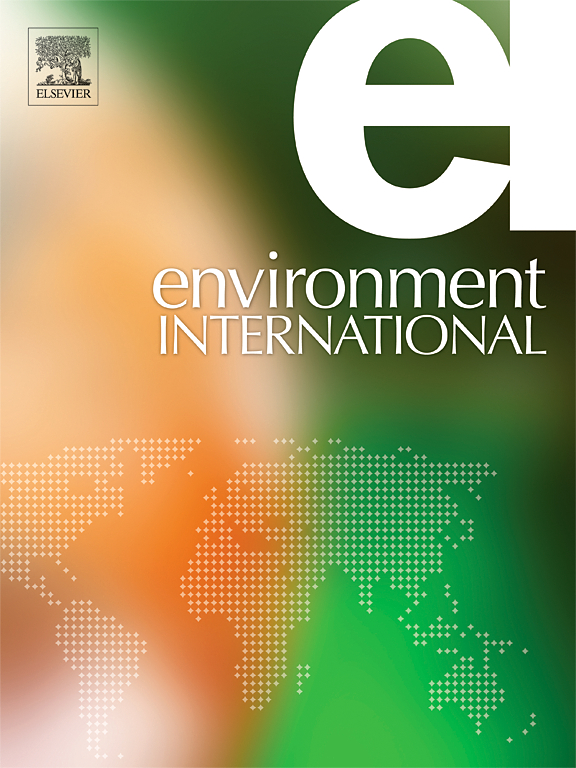在小鼠模型中,暴露于生长促进剂泰络素会引起肠道微生物群破坏和代谢失衡
IF 10.3
1区 环境科学与生态学
Q1 ENVIRONMENTAL SCIENCES
引用次数: 0
摘要
使用抗生素泰络素作为动物生长促进剂(AGPs)所带来的环境风险需要进行评估,因为这类药物被大量使用,环境污染也很常见,但它们对动物和人类的生理和肠道微生物群组成的影响却知之甚少。在这项工作中,我们进行了宏基因组分析,发现tylosin显着破坏了动物肠道微生物群结构,降低了物种多样性,并导致Blautia的相对丰度增加(60.95 %)。观察到含有ARGs的多个contigs富集,表明tylosin促进了抗菌素耐药性(AMR)的发展。回肠组织的转录组学分析显示,基因表达模式的扰动提示线粒体功能障碍和能量代谢失衡。这些改变可能损害营养物质在胃肠道的吸收和利用,并增加肥胖和非酒精性脂肪性肝病(NAFLD)发生的风险。此外,免疫相关基因表达下调被观察到,表明泰络素引起免疫抑制和增加对微生物感染的易感性时,长期使用。肝脏的综合组学分析也显示,通过激活花生四烯酸代谢途径,显著干扰代谢,加剧炎症反应,加速2型糖尿病(T2DM)和NAFLD等代谢紊乱的发生。我们的研究结果揭示了泰络菌素对动物肠道微生物群和代谢功能的有害影响,并强调了泰络菌素释放到环境中对野生动物和人类的潜在健康风险。这些发现强调了谨慎使用agp和开发更安全替代品的必要性。本文章由计算机程序翻译,如有差异,请以英文原文为准。


Exposure to the growth promoter tylosin elicits gut microbiota disruption and metabolic imbalance in mouse model
The environmental risk associated with the usage of the antibiotic tylosin as an animal growth promoter (AGPs) needs to be assessed because such agents are used in abundance and contamination of the environment is common, yet their effects on the physiology and gut microbiota composition of animals and humans are poorly understood. In this work, we performed metagenomic analysis and revealed that tylosin significantly disrupted the gut microbiota structure of animals, reduced species diversity, and caused the increase in the relative abundance of Blautia (60.95%). Enrichment of multiple contigs containing ARGs was observed, indicating that tylosin promotes antimicrobial resistance (AMR) development. Transcriptomic analyses of ileum tissues revealed perturbation in gene expression patterns suggestive of mitochondrial dysfunction and energy metabolism imbalance. These alterations might compromise nutrient absorption and utilization in the GI tract, and heighten the risk of development of obesity and non-alcoholic fatty liver disease (NAFLD). Furthermore, downregulation of immune-related gene expression was observed, indicating that tylosin caused immunosuppression and increased susceptibility to microbial infections when used over extended periods. Integrated omics analysis of the liver also showed significant disturbances in metabolism through activation of the arachidonic acid metabolism pathway, exacerbating inflammatory responses, and precipitating the occurrence of metabolic disorders such as type 2 diabetes mellitus (T2DM) and NAFLD. Our findings unveil the detrimental effects of tylosin on animal gut microbiota and metabolic functions and highlight the potential health risks to wildlife and humans when released into the environment. These findings highlight a need for cautious use of AGPs and the development of safer alternatives.
求助全文
通过发布文献求助,成功后即可免费获取论文全文。
去求助
来源期刊

Environment International
环境科学-环境科学
CiteScore
21.90
自引率
3.40%
发文量
734
审稿时长
2.8 months
期刊介绍:
Environmental Health publishes manuscripts focusing on critical aspects of environmental and occupational medicine, including studies in toxicology and epidemiology, to illuminate the human health implications of exposure to environmental hazards. The journal adopts an open-access model and practices open peer review.
It caters to scientists and practitioners across all environmental science domains, directly or indirectly impacting human health and well-being. With a commitment to enhancing the prevention of environmentally-related health risks, Environmental Health serves as a public health journal for the community and scientists engaged in matters of public health significance concerning the environment.
 求助内容:
求助内容: 应助结果提醒方式:
应助结果提醒方式:


